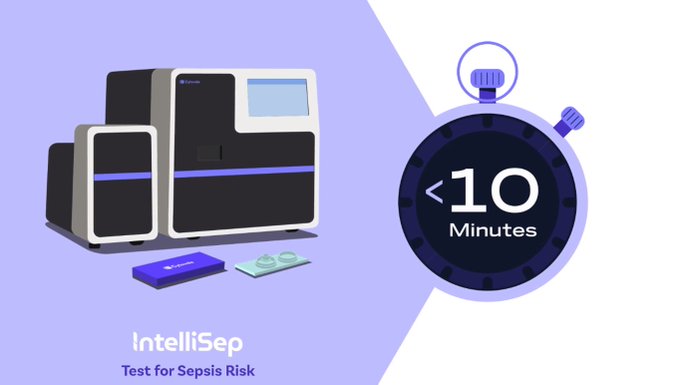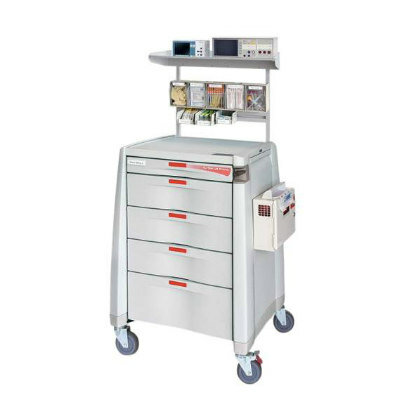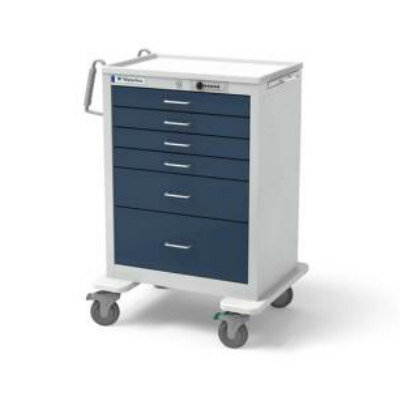10-Minute Sepsis Risk Test Could Change the Way Emergency Departments Recognize and Treat Sepsis
|
By HospiMedica International staff writers Posted on 10 Feb 2022 |

A novel test designed to quantify the state of immune activation by measuring the biophysical properties of leukocytes from a routine blood sample in less than 10 minutes is pioneering a new way of quickly and accurately stratifying a patient’s risk of sepsis.
Cytovale (San Francisco, CA, USA), a medical diagnostics company focused on providing rapid and insightful tools to improve early detection of fast-moving and immune-mediated diseases, is preparing for the commercial launch of its 10-minute IntelliSep sepsis risk stratification test.
Data from previously published studies have shown that Cytovale’s IntelliSep test quickly and clearly distinguished mortality risk in a high-acuity population and accurately identified patients with infections severe enough to cause morbidity and mortality. These data demonstrate the 10-minute test’s potential to aid physicians in rapidly identifying patients at increased risk of having or developing sepsis, a dysregulated immune (white blood cell) response to infection, which is highly lethal and difficult to quickly and accurately diagnose.
Cytovale has received additional funding from Biomedical Research and Development Authority (BARDA) to help advance the company’s 10-minute IntelliSep sepsis risk stratification test towards commercial launch. Originally awarded in 2019, the contract provides manufacturing ramp-up support for the launch of IntelliSep, once a US Food and Drug Administration (FDA) 510(k) clearance of the product is obtained.
“This execution of the final option in the contract will help us complete manufacturing ramp-up as we prepare to launch our IntelliSep test, making a reality of our vision for a critical, time-saving tool with the potential to change the way emergency departments recognize and treat sepsis,” said Cytovale co-founder and CEO Ajay Shah. “In addition to the financial investment, we believe the funding underscores the importance of these final manufacturing activities necessary to bring IntelliSep to market to address an unmet need and help physicians more quickly and accurately assess patients who may have this deadly and debilitating condition.”
Related Links:
Cytovale
Latest Critical Care News
- AI Interpretability Tool for Photographed ECG Images Offers Pixel-Level Precision
- AI-ECG Tools Can Identify Heart Muscle Weakness in Women Before Pregnancy
- AI Model Analyzes Patient Data to Diagnose Multiple Sclerosis With 90% Accuracy
- Magnetically Navigable Microparticles Enable Targeted Drug Delivery
- AI-Powered Algorithm Automates Analysis of Coronary Stents After Implantation
- New Stroke Risk Scoring System to Help Avoid Unnecessary Surgeries
- Wearable Device Tracks Individual Cells in Bloodstream in Real Time
- Drug Delivery System Uses Ultrasound-Activated Nanoparticles to Destroy Bacterial Biofilms
- New Potent Injectable Therapy Could Prevent Heart Failure After Heart Attack
- Hospital-Based System Combines AI and Genomic Surveillance to Quickly Detect Infectious Disease Outbreaks
- New Approach to Visualizing Blood Pressure Data Can Help Better Manage Hypertension Patients
- Breakthrough AI Technology Accurately Assesses Heart Failure Severity
- Smart Bandage Monitors Chronic Wounds in Human Patients
- AI Identifies Patients with Increased Lung Cancer Risk Up To 4 Months Earlier
- Next Gen Hemodynamic Monitoring Solution Provides AI-Driven Clinical Decision Support
- AI Algorithm Identifies High-Risk Heart Patients
Channels
Surgical Techniques
view channel
Early TAVR Intervention Reduces Cardiovascular Events in Asymptomatic Aortic Stenosis Patients
Each year, approximately 300,000 Americans are diagnosed with aortic stenosis (AS), a serious condition that results from the narrowing or blockage of the aortic valve in the heart. Two common treatments... Read more
New Procedure Found Safe and Effective for Patients Undergoing Transcatheter Mitral Valve Replacement
In the United States, approximately four million people suffer from mitral valve regurgitation, the most common type of heart valve disease. As an alternative to open-heart surgery, transcatheter mitral... Read more
No-Touch Vein Harvesting Reduces Graft Failure Risk for Heart Bypass Patients
A coronary artery bypass graft (CABG) is a surgical procedure used to enhance blood flow and oxygen supply to the heart in individuals with coronary heart disease. During the procedure, a healthy blood... Read more
DNA Origami Improves Imaging of Dense Pancreatic Tissue for Cancer Detection and Treatment
One of the challenges of fighting pancreatic cancer is finding ways to penetrate the organ’s dense tissue to define the margins between malignant and normal tissue. Now, a new study uses DNA origami structures... Read morePatient Care
view channel
Portable Biosensor Platform to Reduce Hospital-Acquired Infections
Approximately 4 million patients in the European Union acquire healthcare-associated infections (HAIs) or nosocomial infections each year, with around 37,000 deaths directly resulting from these infections,... Read moreFirst-Of-Its-Kind Portable Germicidal Light Technology Disinfects High-Touch Clinical Surfaces in Seconds
Reducing healthcare-acquired infections (HAIs) remains a pressing issue within global healthcare systems. In the United States alone, 1.7 million patients contract HAIs annually, leading to approximately... Read more
Surgical Capacity Optimization Solution Helps Hospitals Boost OR Utilization
An innovative solution has the capability to transform surgical capacity utilization by targeting the root cause of surgical block time inefficiencies. Fujitsu Limited’s (Tokyo, Japan) Surgical Capacity... Read more
Game-Changing Innovation in Surgical Instrument Sterilization Significantly Improves OR Throughput
A groundbreaking innovation enables hospitals to significantly improve instrument processing time and throughput in operating rooms (ORs) and sterile processing departments. Turbett Surgical, Inc.... Read moreHealth IT
view channel
Printable Molecule-Selective Nanoparticles Enable Mass Production of Wearable Biosensors
The future of medicine is likely to focus on the personalization of healthcare—understanding exactly what an individual requires and delivering the appropriate combination of nutrients, metabolites, and... Read more
Smartwatches Could Detect Congestive Heart Failure
Diagnosing congestive heart failure (CHF) typically requires expensive and time-consuming imaging techniques like echocardiography, also known as cardiac ultrasound. Previously, detecting CHF by analyzing... Read moreBusiness
view channel
Expanded Collaboration to Transform OR Technology Through AI and Automation
The expansion of an existing collaboration between three leading companies aims to develop artificial intelligence (AI)-driven solutions for smart operating rooms with sophisticated monitoring and automation.... Read more















